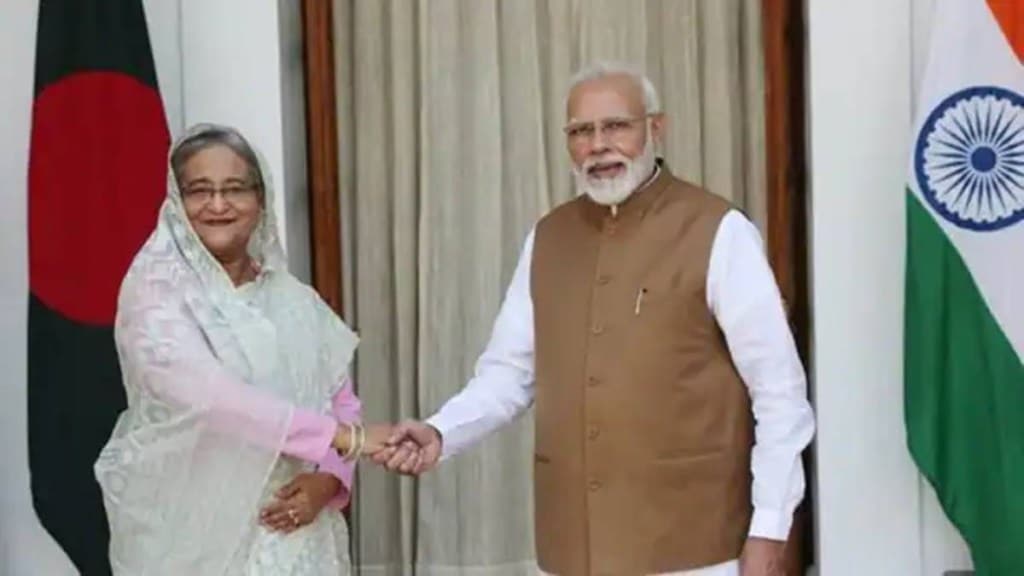At the invitation of Prime Minister Narendra Modi, Prime Minister Sheikh Hasina of Bangladesh is set to pay a state visit to India on June 21-22, 2024. This visit holds significant importance as it marks the first incoming bilateral state visit following the formation of the Indian government after the 18th Lok Sabha elections. Prime Minister Hasina’s visit is poised to reinforce the deep-rooted ties between the two neighboring countries and address several key bilateral issues.
During her visit, Prime Minister Hasina will engage in bilateral consultations with Prime Minister Modi, hold meetings with President Droupadi Murmu and Vice President Jagdeep Dhankhar, and receive a call-on from the External Affairs Minister of India. The key meeting between the two prime ministers is scheduled for June 22 at Hyderabad House.
The timing of this visit is particularly noteworthy as it precedes Prime Minister Hasina’s official trip to China in July. During her attendance at the oath-taking ceremony of Prime Minister Modi and his cabinet on June 9, she had a private meeting with Modi, extending an invitation for him to visit Dhaka later this year.
Key Agenda Items
Several critical issues are on the agenda for the upcoming talks. Foremost among them is the pending Teesta River water-sharing agreement, a long-standing issue between the two nations. Both sides are also looking to renew the Ganges River water-sharing agreement, set to expire in 2026. Another significant concern is the establishment of a new mechanism to reduce border killings, a recurring issue impacting bilateral relations.
Bangladesh is eager to initiate immediate negotiations on these matters, with the Joint River Commission expected to begin talks soon. The Teesta River, in particular, has been a focal point of discussion, with China’s interest in funding the basin development project adding complexity to the negotiations. Due to India’s reservations about China’s involvement, Bangladesh has put the project on hold. During a recent visit to Dhaka, Indian Foreign Secretary Vinay Kwatra expressed India’s willingness to participate in the Teesta River basin management, potentially leading to joint efforts in dredging the river to increase water flow.
Strategic Importance
This visit is strategically significant for both nations. According to Gautam Lahiri, a senior journalist and Bangladesh commentator, India was keen to host Prime Minister Hasina before her China visit to ensure alignment on key issues and avoid any diplomatic friction. Additionally, the Bangladesh leader seeks to maintain strong ties with India, her country’s most trusted neighbor.
India and Bangladesh have witnessed an upswing in their strategic ties over the past few years, with cooperation extending to security, trade, commerce, energy, connectivity, science and technology, defense, and maritime affairs. The visit aims to further enhance these ties, with discussions likely to include the speedy implementation of the $500 million Line of Credit (LOC) on defense and the potential for joint military exercises.
Economic and Infrastructure Cooperation
FinancialExpress.com has recently reported that economic partnership and infrastructure development are also expected to be prominent topics. India is keen to advance a new bilateral economic partnership, seeking a greater role in the Mongla sea port, similar to its involvement in the Chabahar Port in Iran. Additionally, a new sea route extending to the Indo-Pacific is on the agenda, as well as expanding the “Sagar” project to enhance maritime cooperation in the Indian Ocean region.
During the recent oath-taking ceremony in Delhi, representatives from key Indian Ocean archipelago nations like Mauritius, Seychelles, Sri Lanka, and the Maldives were present. Prime Minister Hasina also met with the Prime Minister of Bhutan and the President of Sri Lanka, discussing regional cooperation. Bangladesh aims to import more hydropower from Bhutan, requiring India’s consent for the transportation of power through Indian Territory.
Further discussions are expected on inaugurating the Feni Moitree Bridge for public transport and opening the second unit of the Rampal Moitree power plant. Both projects symbolize the deepening connectivity between the two nations. Passenger movement through Maitri Setu, a bridge connecting India and Bangladesh in the south Tripura district, is set to commence by September this year.
Future Prospects
The bilateral talks between Prime Ministers Modi and Hasina are anticipated to elevate India-Bangladesh relations to new heights. Bangladesh is a crucial partner for India under its “Neighbourhood First” policy, and the cooperation spans multiple sectors. Notably, Bangladesh is India’s largest development partner, with nearly one-fourth of New Delhi’s commitment under the Line of Credit being directed towards it. Bangladesh is also India’s biggest trading partner in South Asia, and India is the second-largest trading partner of Bangladesh in Asia.
In 2022-23, the total bilateral trade between the two nations was reported to be USD 15.9 billion, with Bangladesh exporting approximately USD 2 billion worth of goods to India. As the two countries prepare for Prime Minister Hasina’s visit, there is optimism about further strengthening these robust economic and strategic ties, paving the way for greater regional stability and development.
